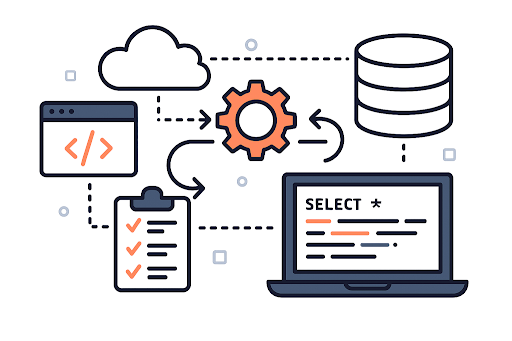Teams often say they have automated testing in place: unit tests, integration tests, linting. But when it comes to the database, things get fuzzier. Developers often work with empty databases or synthetic seed data that don’t reflect reality, while staging becomes the shared catch-all for testing everything else. Over time, both drift from production: seed data grows outdated, staging fills with broken migrations, and no one fully trusts the results. Testing turns into guesswork before shipping.
Baseshift replaces unreliable staging and fake seed data with consistent, isolated, production-like environments. It provides on-demand database clones that are lightweight, writable, anonymized, and audited. Every pull request runs against fresh, accurate data rather than outdated setups.
Why Preview Environments Fail
Anyone who has waited hours for an operations team to refresh staging knows the pain. The data is incomplete, too old, or already being used by someone else. The results cannot be trusted.
With Baseshift, a CI job requests a smart production clone and gets it in seconds. Each clone is isolated and tied to the specific test run. When the job finishes, the clone is automatically destroyed. No manual scripts. No delays. No conflicts over shared databases.
What a CI Pipeline Looks Like With Baseshift
A practical workflow looks like this:
- A developer opens a pull request.
- CI/CD sends Baseshift an API call to spin up a clone.
- Database migrations re applied.
- Automated SQL tests run, validating queries, schema integrity, and performance.
- The clone is deleted when the job completes.
Baseshift supports PostgreSQL, MySQL, and MongoDB, so the same workflow applies across your databases.
Why We Built It This Way
Developers do not need another dashboard. Baseshift works in the background and integrates directly with GitHub Actions, GitLab CI, Jenkins, and other CI/CD systems. Clones are created by API/CLI and removed automatically, so there is nothing new to maintain.
The intention is to make automated SQL testing boring and routine, like unit tests. You should not have to think about them. You should simply expect them to run.
Real Capabilities From Baseshift
- Clones spin up in seconds and mirror production safely.
- Pseudonymization, masking, subsetting, and audit logging are built in.
- Supports Postgres, MySQL, and MongoDB.
- Every developer can get their own environment, reducing conflicts and wasted time on staging.
- Test runs and migrations in CI get individual, isolated database instances.
- Puts DB change transparency and risk mitigation on your Pull Request.
Ship Without Guesswork
CI/CD pipelines that skip database testing are incomplete. They validate code while ignoring queries and schema changes, which is how migrations break in production and cause late-night incidents.
Baseshift closes this gap. With real database clones and automated SQL testing built into your pipeline, you catch issues before deployment. Releases are faster and more reliable, and developers can focus on building instead of fixing.
